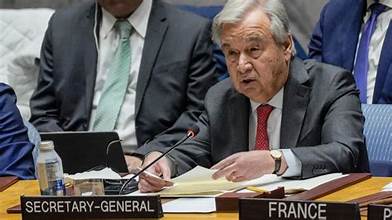UN Warns Israel:
UN Chief Antonio Guterres warns that Israel’s rejection of a two-state solution in the Israeli-Hamas conflict threatens global peace and emboldens extremists.
Risks of Regional Escalation:
Guterres warns of escalating regional risks in the Israeli-Hamas conflict, citing Lebanon, Yemen, Syria, Iraq, and Pakistan. He urge parties to reconsider wider war’s horrendous costs.
Two State Solutions: Support by Countries:
Netanyahu’s refusal of a Palestinian state postwar strained ties with the US. The US insists the war should lead to two-state solution negotiations, a goal supported globally.
Saudi Arabia Stance:
Saudi Deputy Minister of Foreign Affairs Waleed Elkhereiji questions the ongoing tragedy in Gaza without serious action or measures to halt civilian suffering. He emphasizes the necessity of a lasting solution for peace and regional stability. Elkhereiji urges immediate ceasefire, peace restoration, and protection of Palestinian dignity and rights. He underscores the importance of a credible, irreversible path toward an independent Palestine state for coexistence, security, and development.
Death Toll:
The health ministry reports over 25,000 civilian deaths, primarily children and women, as Israel intensifies attacks on Gaza to eradicate Hamas.
Violation of International law:
We strongly reject any violations of international humanitarian law and condemn the targeting of civilians. The Council must compel Israel to respect international law and end this suffering. He also cautioned against the risks of military escalation and its impact on regional security and stability.
Military Operations in Red Sea:
“Military operations in the Red Sea and the Yemeni republic are a source of concern. The necessary measure therefore must be taken to contain incidences and repercussions of this crisis, which is affecting neighboring countries and international peace and security.”
Immediate Ceasefire
The UN Ambassador from the United Arab Emirates, Lana Zaki Nusseibeh, addressed the council: “We need an immediate humanitarian ceasefire in Gaza. The overwhelming majority of the international community has called for this, repeatedly. It is time for the minority view to stop obstructing it from happening.”
She added: “The humanitarian imperative at this moment must be our top priority, in addition to the ceasefire, so that life-saving aid can enter at scale, and hostages can be allowed out and returned to their families safely.”
Pakistan Stance:
Pakistan described Israel’s conduct in Gaza as genocidal and urged increased acknowledgment of the Palestinian cause.
“It is time to admit Palestine as a full member of the United Nations,” said. Munir Akram, Pakistan’s permanent representative to the UN.
US Diplomacy:
But Israel’s UN Ambassador Gilad Erdan again rejected a ceasefire, saying Hamas, which carried out a brutal attack on southern Israel on Oct. 7, is committed to attacking again and destroying Israel, and a halt to fighting will only allow the militants “to regroup and rearm.”
He called on the Security Council to address the fundamental cause of the conflict, identifying Iran as the root of the issue.
Iran Provides Weapons:
Erdan strongly condemned the presence of Iran’s foreign minister at the council meeting, accusing the country of supplying weapons to Hamas, Hezbollah fighters in Lebanon, and Houthi militants in Yemen, “and soon these acts will be carried out under a nuclear umbrella” and “Iran’s terror will reach all of you.”
Iran consistently denies pursuing nuclear weapons, asserting its nuclear program is for peaceful purposes. However, the UN nuclear watchdog cautioned about Iran possessing enough enriched uranium for potential nuclear bombs. Iran’s Foreign Minister Hossein Amirabdollahian, while not addressing the nuclear program, warned Israel that it would not achieve its stated goal of destroying Hamas.
“The killing of civilians in Gaza and the West Bank cannot continue on to the so-called total destruction of Hamas, because that time will never come,” he said. “Stopping the genocide in Gaza is the main key to security in the region.”
Riyad Al-Maliki, the Palestinian foreign minister, asserted that Israel is conducting the most brutal bombing campaign since World War II, resulting in famine and extensive displacement of civilians. Describing it as an assault of atrocities, he emphasized the destruction of numerous innocent lives.
Palestine: A Political Reality:
Al-Maliki claims Israel views Palestinians as a demographic threat, seeking elimination through death, displacement, or subjugation, not coexistence. He said those are the choices Israel has offered Palestinians, calling them tantamount to “genocide, ethnic cleansing or apartheid.”
Al-Maliki outlines two paths: one begins with Palestinian freedom, leading to Mideast peace; the other denies freedom, causing conflict. France’s foreign minister warns of a real regional conflagration.
He said the world should unite and deliver different messages to the warring parties.
Israel Accountability:
Jordan’s Foreign Minister Ayman Safadi said the “ideology of hate embraced openly by Israeli ministers is normalizing the mass murder of Palestinians” and urged the council to stop it with a binding resolution.
Safadi insists Israel should face accountability for war crimes and obstructing a Palestinian state. He condemns extremist Israeli agendas and settler terrorism against Palestinians.
















